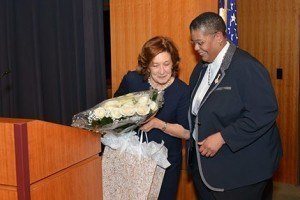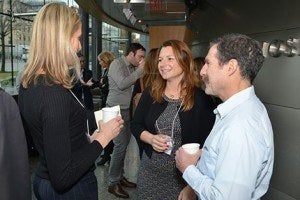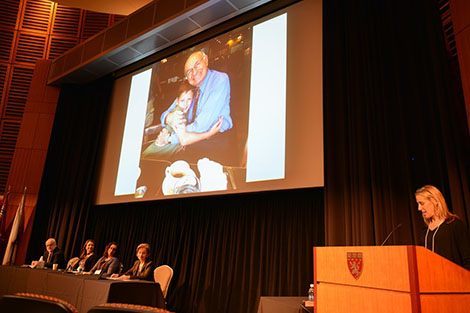Former students, colleagues remember his kindness, generosity, passion for science
December 10, 2015 — Scientists from around the globe joined Harvard T.H. Chan School of Public Health faculty, alumni, and students at the 162nd Cutter Lecture on Preventive Medicine to pay tribute to the legacy of the late Dimitrios Trichopoulos, SM ’68, a leading cancer epidemiologist, who died last year. More than 20 speakers at the day-long symposium on December 2, 2015 described how Trichopoulos’s love of teaching and mentoring and his lifelong passion for epidemiology led to critical findings on breast, lung, and liver cancer, and other diseases.
Trichopoulos, the Vincent L. Gregory Professor of Cancer Prevention and Professor of Epidemiology and a past chair of the Department of Epidemiology, died on December 1, 2014 at age 75. He published more than 1,000 scientific papers, continually staking out scientific frontiers—from seminal research linking secondhand smoke from cigarettes with an increased risk of lung cancer, to findings documenting that surgically induced and early natural menopause reduced breast cancer risk. Read more about his many contributions.
“He was generous, had a kind spirit, and a long-lasting love affair with the discipline of epidemiology,” said Michelle Williams, Stephen B. Kay Family Professor of Public Health and chair, Department of Epidemiology, in her welcoming remarks. Many of those attending the program at the Joseph B. Martin Center were epidemiologists whose lives and work he touched.

Williams quoted Trichopoulos from an interview that she did with him for the journal Epidemiology. When asked for his views on the state of the field, he replied: “Epidemiology is here to stay. It’s important. It’s critical. It has already expanded to evaluating health care and the performance of treatment and outcomes research…Many people believe they can practice epidemiology just by having the appropriate technology. It is not so. In epidemiology, you may have the tools, the statistical packages, the resources, the data linkage, etc. You still really need the epidemiologist….”
David Hunter, Acting Dean and Vincent L. Gregory Professor in Cancer Prevention, recalled being a student in Trichopoulos’s epidemiology class. “He had no slides — he just talked. He kept the class spellbound,” said Hunter, who succeeded Trichopoulos as director of the Harvard Center for Cancer Prevention. He described how Trichopoulos encouraged him to publish papers early in his career. “It was that level of optimism and generosity that made him distinctive.” In his final weeks, Trichopoulos came directly to the School with suitcase in hand immediately after being released from a Boston hospital, Hunter said. “He loved his work and his colleagues.”

Christina Bamia, of the University of Athens was one of a number of speakers who discussed Trichopoulos’s contributions to the CHANCES Consortium on Health and Aging and other major studies in Europe and his native Greece. Bamia said the Hellenic Health Foundation, established in Greece by Trichopoulos and his wife Antonia, will be renamed in his honor.
In his remarks, Frank Sacks, professor of cardiovascular disease prevention, described working with Trichopoulos on the contentious effort to establish that the Mediterranean diet is healthier than a low-fat diet.
Lorelei Mucci, associate professor of epidemiology, called Trichopoulos a mentor and friend. “Dimitrios was one of the most spectacular individuals I have ever known. He encouraged us as students to be bold in our scientific hypotheses, but also to not be afraid to be wrong. I learned from observing Dimitrios that kindness and generosity are two of the most important qualities in science, qualities to be aspired to. He was generous in every aspect of his life. We miss him every day.”
Photos: Azeddine Tahiri
